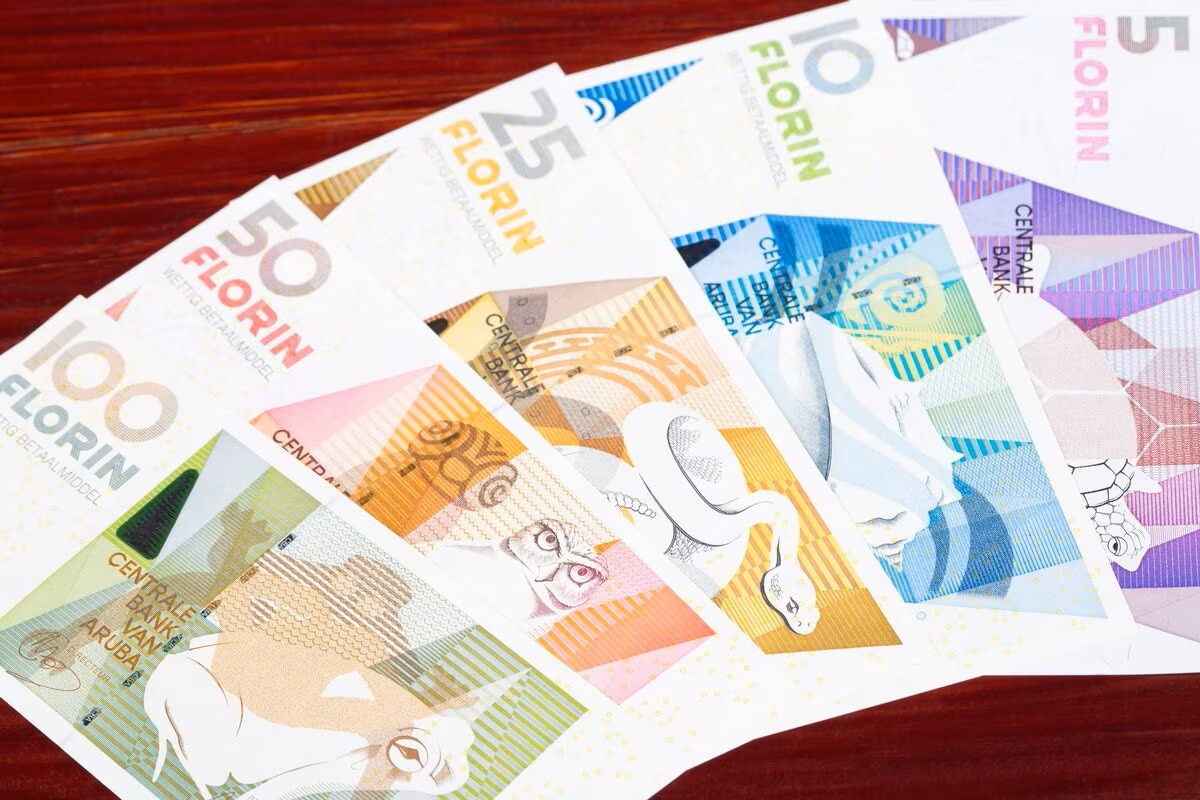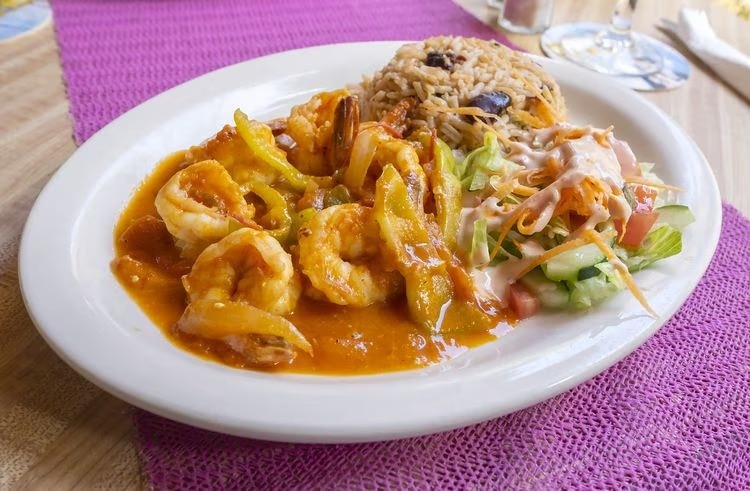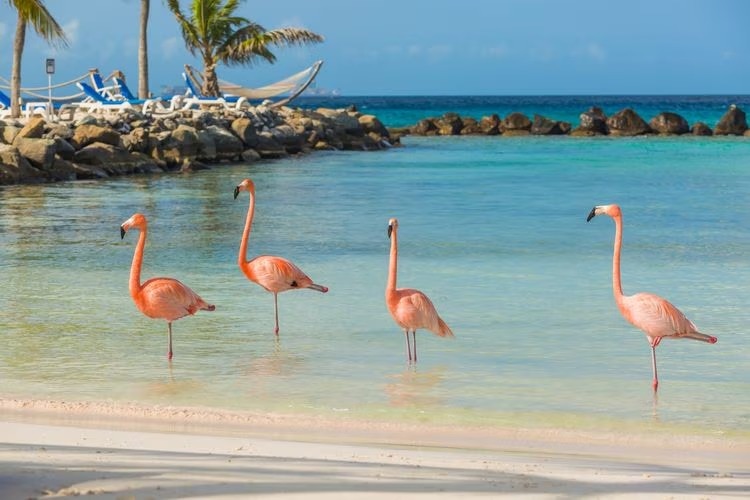Aruba Travel Tips and Information
Official Name
Republic of Aruba
Capital
Oranjestad
Population
Country Code
Approximately 108,000
AW
Country Code (international calls)
+297
The flight time to Aruba is approximately ---- hours. Check the climate, currency, religion, manners, other information of Aruba below. Wishing you pleasant travels to Aruba.
Aruba is an island in the Caribbean Sea. It lies north of the South American continent and south of Venezuela. It is one of the four countries that make up the Kingdom of the Netherlands.
Local Climate / Weather
Aruba is known for its warm, dry, and sunny weather, making it an ideal destination for travelers seeking a tropical getaway. Located outside the hurricane belt, Aruba enjoys year-round stable temperatures, typically ranging from 27 to 32 degrees Celsius. The island experiences two main seasons: a dry season from January to September and a slightly wetter season from October to December, though rain showers are usually brief and occur mostly at night. ・Dry Season (January to September): This period is perfect for beach activities, water sports, and sightseeing as the weather is consistently sunny and warm. During these months, Travelers can enjoy Aruba’s pristine beaches and crystal-clear waters without interruption from rain, making it ideal for those who prefer a sun-drenched holiday. ・Rainy Season (October to December): While considered the wet season, Aruba only sees short, occasional rain showers during these months. Travelers who visit in this period can expect slightly cooler evenings and less crowded tourist spots. It’s a good time for those looking for a quieter travel experience while still enjoying Aruba’s warmth.
Currency & Tipping
Currency
When planning your trip to Aruba, it's helpful to understand the local currency and tipping practices. Aruba’s official currency is the Aruban Florin (AWG), but U.S. dollars are widely accepted, making it convenient for travelers. Major credit cards are also commonly used, especially in tourist areas, so exchanging a large amount of currency may not be necessary.
Tipping
As for tipping, it’s customary to leave around 10-15% of the bill in restaurants and for taxi services if gratuity is not already included. Some restaurants may add a service charge, so be sure to check your bill. Hotel staff, such as bellhops and housekeepers, generally receive tips of around $1-2 (or equivalent in florins) per service. Understanding these norms can enhance your travel experience and show appreciation for local hospitality.
Useful Travel Information

Voltage & Electrical Outlets
In Aruba, the standard voltage is 127 V with a frequency of 60 Hz. Travelers should bring a voltage converter to safely use appliances if necessary. The power plugs and sockets used in Aruba are primarily of types A, B, and F, so a travel adapter is also recommended for compatibility.

Internet Connectivity
Aruba offers robust internet connectivity, with many hotels, resorts, and public spaces providing free Wi-Fi access. Local mobile carriers, such as Setar and Digicel, offer prepaid SIM cards and affordable data plans for visitors looking to stay connected on the go. These plans include options for high-speed data that can be convenient for checking maps, using social media, or keeping in touch with loved ones back home.
Water for Consumption (Drinking Water)
Aruba’s tap water is known for being safe to drink, as it meets high-quality standards similar to those in Europe and North America. The water is produced through an advanced desalination process, providing fresh, clean drinking water directly from the tap, which can help travelers save on bottled water costs.
Culture, Religion & Social Etiquette
Culture
Aruba, a charming Caribbean island known for its diverse cultural blend, offers travelers a unique experience with its warm hospitality and rich heritage. Understanding Aruba’s cultural and religious landscape, as well as local manners, can enhance any visit and make interactions with locals more meaningful.
Religion
Roman Catholicism is the predominant religion, but Aruba’s multicultural society is home to a range of beliefs, including Protestantism, Judaism, and Islam. Respect for all religions is common, and visitors will find churches, mosques, and other places of worship across the island. Festivals and holidays, like Easter and Christmas, are celebrated with enthusiasm and reflect Aruba’s religious diversity.
Social Etiquette
Arubans are known for their friendliness and welcoming spirit. It’s customary to greet people with a handshake or even a kiss on the cheek if familiar. Dress codes are generally casual, but more formal attire is appreciated when visiting religious sites or upscale restaurants. Tipping is also common in Aruba, around 10-15% in restaurants, reflecting appreciation for good service. Arubans value politeness, so a simple “Bon dia” (Good morning) can go a long way in interactions. This cultural guide for travelers emphasizes Aruba’s unique blend of customs and practices, offering insights that will make your experience memorable.
Food Culture
Aruba's cuisine offers a vibrant blend of Caribbean flavors with influences from the Netherlands, Latin America, and even Indonesia, creating a unique culinary scene that travelers will find exciting and flavorful. Aruba's dishes often feature fresh seafood like mahi-mahi, red snapper, and lobster, accompanied by sides of rice, plantains, and hearty stews, creating a comforting yet exotic dining experience that will resonate with palates. Popular dishes like "keshi yena," a baked cheese-stuffed delight with chicken or seafood, and "pastechi," a pastry filled with cheese or meat, offer rich flavors familiar yet new. Street food is a must-try in Aruba, providing travelers with convenient and affordable ways to savor local flavors. Stalls and food trucks around the island serve up local favorites like "empanadas," which are similar to empanadas but with a unique Caribbean twist, and "bolo di cashupete," a sweet cashew cake that adds a taste of the island’s dessert culture. "Fish shack" food spots near the beach offer casual dining where guests can enjoy fresh fish dishes in a relaxed setting, capturing the essence of Aruba’s island vibe. For travelers seeking a sit-down meal, Aruba boasts many restaurants that cater to diverse tastes. Local favorites include Papiamento Restaurant, where traditional Aruban flavors meet fine dining in a charming setting; The Old Cunucu House, which serves authentic Aruban dishes in a historic farmhouse; and Zeerover, a seaside spot famous for its fresh fish and laid-back atmosphere, where diners can watch the sunset while savoring their meal. For those who want to explore fusion cuisine, Yemanja Woodfired Grill offers Caribbean-inspired dishes with a modern twist. This vibrant mix of food culture, from street eats to restaurant dining, makes Aruba a culinary destination that all travelers will truly enjoy.
Major Tourist Attractions & UNESCO World Heritage Sites
Major Tourist Attractions
Aruba is an island-wide marine resort with an abundance of marine sports such as snorkeling, diving, windsurfing, and kite boarding. Golf and horseback riding are also available. Cruises are the main activity, and cruise ships dock at the port of Oranjestad, the main capital. There are also 11 beaches, and some hotels offer beach weddings on white beaches. How about a luxurious wedding on Aruba's white beaches?
UNESCO World Heritage Sites
Aruba does not have a World Heritage Site, but there is a World Heritage Site on the neighboring island of Curaçao, which is only a 50-minute flight away, so it is recommended to take a short trip there. The historical area of the port town of Willemstad, known as a World Heritage Site in Curaçao. Villemstad looks like something out of a fairy tale with its colorful square buildings in pastel shades.
Travel FAQs
Which airport is the most popular for flights to Aruba?
Queen Beatrix International Airport is the main entry point for travelers.
When is the best time to visit Aruba?
The best season is from January to March.
How much should I tip in Aruba’s restaurants and taxis?
Tipping is generally not expected at restaurants, but for taxis, a tip of around 10% is often given.
Is English widely spoken in Aruba?
English is widely spoken due to the large number of American visitors, along with Dutch. Tagalog, however, is not commonly understood.




